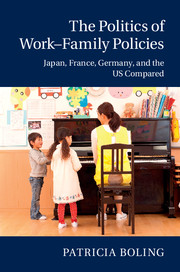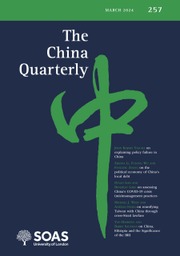The Politics of Work–Family Policies
The work-family policies of Sweden and France are often held up as models for other nations to follow, yet political structures and resources can present obstacles to fundamental change that must be taken into account. Patricia Boling argues that we need to think realistically about how to create political and policy change in this vital area. She evaluates policy approaches in the US, France, Germany and Japan, analyzing their policy histories, power resources, and political institutions to explain their approaches, and to propose realistic trajectories toward change. Arguing that much of the story lies in the way that job markets are structured, Boling shows that when women have reasonable chances of resuming their careers after giving birth, they are more likely to have children than in countries where even brief breaks put an end to a career, or where motherhood restricts them to part-time work.
- Based on detailed and accessible case studies of four OECD countries
- Provides clear, current comparative data about demographic change and policy approaches, and includes interviews with policy makers and experts
- Argues that new approaches to family policy are constrained by political institutions, processes and path-dependent policy development
Reviews & endorsements
"Family policy has been an area of remarkable innovation over the past two decades, driven by concerns about declining fertility rates and persistent gender inequity. Boling helps us understand what is driving this innovation, and why these initiatives have been more successful in some places than others."
Len Schoppa, University of Virginia
"In this ambitious book, Patricia Boling brings the comparativist’s lens to the vitally important topic of how states succeed or falter in supporting working parents and their children. Rather than exploring the well-worn terrain of how 'Sweden does it best', she incisively asks what it is about states, political institutions, and political alliances that makes adoption of work-family policies more feasible in some countries than in others. This is an important book for all who care about improving individual well-being and opportunity across generations in twenty-first-century post-industrial societies."
Mary C. Brinton, Harvard University
Product details
February 2017Paperback
9781107484108
290 pages
230 × 150 × 15 mm
0.42kg
21 b/w illus. 29 tables
Available
Table of Contents
- Preface
- 1. Why work-family policies matter, and how best to study them
- 2. Demographic and policy trends in OECD countries
- 3. Familialist policies in France
- 4. Germany enacts change
- 5. Japan confronts low fertility and rapid aging
- 6. The US relies on families and markets
- 7. Evaluating work-family policies
- 8. Why the US can't be Sweden.









